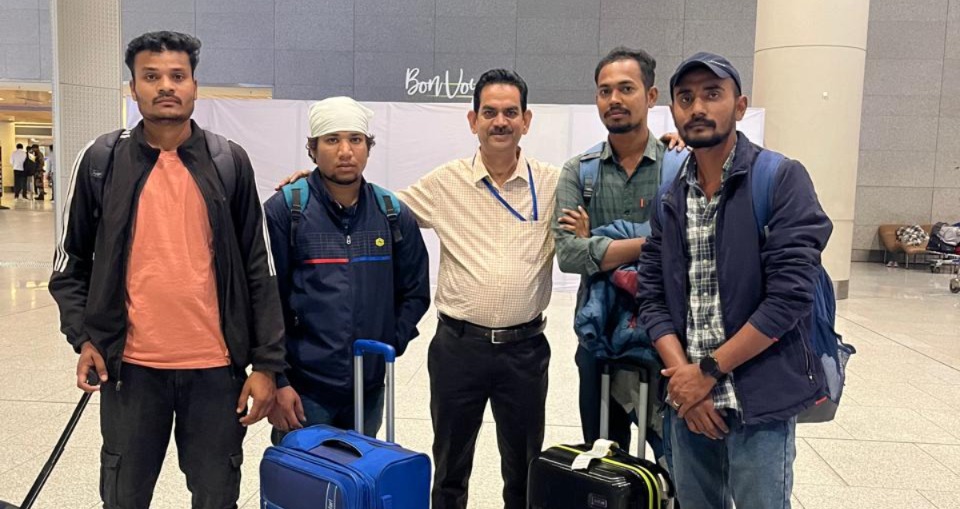In a significant display of prompt governmental intervention, four migrant workers from Odisha’s Ganjam district, who were stranded in Oman, have safely returned home. Their repatriation was made possible through the coordinated efforts of Odisha Chief Minister Mohan Charan Majhi, the Ministry of External Affairs (MEA), and the Indian Embassy in Oman.

The Ordeal in Oman
The four workers, hailing from various villages in Ganjam, had traveled to Oman seeking employment opportunities. However, upon arrival, they faced severe exploitation at the hands of a private company. Their passports and essential documents were confiscated, and they were deprived of their salaries for five months. When they protested against these injustices, they reportedly received death threats, leaving them in a state of fear and helplessness. Unable to leave the company or return home due to the seizure of their documents, their situation became increasingly dire.
Reports suggest that these workers were lured to Oman by agents who promised them well-paying jobs. However, upon arrival, they realized that the reality was starkly different. They were forced to work under harsh conditions without proper wages or basic amenities. Such cases of exploitation of Indian migrant workers in Gulf countries have been reported frequently, highlighting the need for stricter regulations and better awareness among aspiring workers.
Appeal for Help
The plight of these workers came to light when one of them managed to contact his family in Odisha via a video call, pleading for assistance. The distressing video call, in which the worker described their suffering and inability to escape, triggered a strong response from their families.
Distraught by the revelations, the families approached the Ganjam district administration and the state government, seeking immediate intervention to rescue their loved ones. Local leaders and activists also stepped in, amplifying their plea and urging the government to take swift action.
The workers’ families highlighted the financial struggles they endured to send their relatives abroad. Many had taken loans or mortgaged their properties, hoping that the overseas employment would provide a better future. Instead, they were left anxious and uncertain about the safety of their loved ones.
Government’s Swift Response
Upon receiving reports of the stranded workers through emails and local media outlets, Chief Minister Mohan Charan Majhi took immediate action. He directed the Principal Resident Commissioner in New Delhi to coordinate with the MEA and the Indian Ambassador in Oman to facilitate the workers’ safe return.
The Indian Embassy in Oman promptly located the workers in Sohar and established regular communication with them. Recognizing their vulnerable situation, the embassy arranged for their accommodation and meals at a local gurdwara, ensuring their safety until their departure.
The intervention involved negotiations with local authorities and employers in Oman. In many cases, workers’ release from such situations is complicated due to local labor laws and company contracts. However, diplomatic efforts and pressure from the Indian government led to the resolution of the issue, allowing the workers to return home.
Safe Return to Odisha
The concerted efforts culminated in the workers boarding an Air India Express flight from Muscat to Mumbai, arriving at 4 a.m. on Thursday. Subsequently, they traveled by train to Berhampur, reaching their hometowns on Friday. The successful repatriation underscores the government’s commitment to safeguarding its citizens abroad.
As the workers stepped off the train in Odisha, they were welcomed by their relieved families. Emotional reunions took place as parents, spouses, and children embraced their loved ones, grateful for their safe return. The workers recounted their harrowing experiences and expressed their gratitude to the government for intervening in time.
Expressions of Gratitude
Chief Minister Majhi expressed his heartfelt gratitude to External Affairs Minister S. Jaishankar and the Indian Embassy in Oman for their prompt and effective assistance. In a public statement, he acknowledged the crucial role played by the MEA and the embassy in ensuring the workers’ safe return.
He stated, “Prompt coordination with the External Affairs Ministry ensured the workers’ safe return. The government remains committed to protecting the rights of Odia workers abroad and will continue to take necessary measures to prevent such incidents.”
Additionally, political leaders and the public have lauded the swift actions taken. Kanak Vardhan Singh Deo, a prominent political figure, expressed relief over the workers’ return, emphasizing the importance of governmental intervention in such crises. Social media platforms saw an outpouring of messages appreciating the proactive steps taken by the government.
A Recurring Concern
This incident highlights a recurring issue where workers from Odisha and other regions find themselves stranded abroad under distressing conditions. In December of the previous year, approximately 40 Odia workers, including 11 from the Khallikote block of Ganjam district, were reportedly stranded in the Maldives. They faced severe hardships while employed at a construction company and appealed to the Indian government for immediate rescue.
Many migrant workers, unaware of the risks involved, often fall victim to fraudulent recruitment agencies that lure them with false promises. Once in a foreign land, they find themselves trapped with little to no means of seeking help. While embassies and government bodies do provide assistance, the need for preemptive measures remains crucial.
Preventive Measures and Future Actions
The Odisha government has been proactive in addressing such issues, establishing helplines and support systems for migrant workers. However, the recurring nature of these incidents suggests a need for more robust measures. Strengthening the regulation of overseas recruitment agencies, ensuring workers are well-informed of their rights, and establishing rapid response teams in Indian embassies worldwide could be pivotal steps in preventing such situations.
Experts suggest that the government should collaborate with international organizations to create awareness programs for prospective migrant workers. Workshops and campaigns educating workers about their rights, legal contracts, and emergency contacts can help prevent exploitation.
Furthermore, collaboration between state and central governments is essential to create a comprehensive support system for migrant workers. Regular monitoring and swift interventions can ensure the safety and well-being of Indian citizens employed abroad.
Conclusion
The safe return of the four Odia workers from Oman stands as a testament to the effectiveness of prompt governmental action and inter-departmental coordination. It also serves as a reminder of the challenges faced by migrant workers and the continuous efforts required to protect their rights and welfare on international shores.
As the world becomes increasingly interconnected, the importance of protecting migrant workers cannot be overstated. While this case had a positive outcome, it is imperative that both state and central governments continue to work towards stronger policies and awareness campaigns to prevent similar situations in the future. Ensuring that every Indian worker abroad is safe, secure, and treated with dignity should remain a top priority for the government.
USA Breaks India’s 40-Year-Old Record for Lowest Total Defended in Men’s ODI



